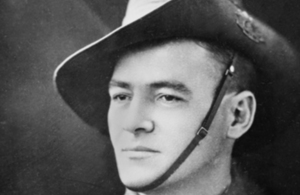WW1 Australian VC recipient Joergen Christian Jensen
The story of Australian First World War Victoria Cross recipient Joergen Christian Jensen.

Joergen Christian Jensen [Credit: Australian War Memorial]
66 men from Australia received the Victoria Cross, Britain’s highest award for gallantry, during the First World War. As part of the Centenary Commemorations the people of the United Kingdom marked their gratitude to those courageous men by presenting a bronze memorial plaque to their home country engraved with their names. The plaque is now displayed at the Australian War Memorial. This archive tells their stories.
Name: Joergen Christian Jensen
DOB: 15 January 1891
Place of Birth: Loegstoer, Denmark
Date of Action: 2 April 1917
Place of Action: Noreuil, France
Rank: Private
Regiment: 50th Infantry Battalion, Australian Imperial Force
Joergen Jensen was born in Loegstoer in Denmark on 15 January 1891, but he moved to Australia in 1909 and became a naturalised subject in 1914. In 1915, he enlisted as a private in the 10th Battalion of the Australian Imperial Force and was sent to Gallipoli that September. Jensen was later transferred to the 50th Battalion.
Private Jensen was awarded his Victoria Cross for most conspicuous bravery and initiative on 2 April 1917 in Noreuil, one of the outpost villages of the Hindenburg Line. His Citation explains further:
With five comrades, he attacked a barricade, behind which were about 45 of the enemy and a machine gun. One of his party shot the gunner, and Private Jensen, single handed, rushed the post, and threw in a bomb. He had still a bomb in one hand, but taking another from his pocket with the other hand he drew the pin with his teeth, and by threatening the enemy with two bombs and by telling them that they were surrounded, he induced them to surrender. Private Jensen then sent one of his prisoners to order a neighbouring enemy party to surrender, which they did. This latter party was then fired on in ignorance of their surrender by another party of our troops, whereupon Private Jensen, utterly regardless of personal danger, stood on the barricade, waved his helmet caused the firing to cease, and sent his prisoners back to our lines. Private Jensen’s conduct throughout was marked by extraordinary bravery and determination.
Jensen was severely wounded in May 1918 whilst on patrol, and he was later invalided back to Australia. After the war, he married and worked in a hotel and later as a marine-store dealer. He died from his war-related wounds in Adelaide in 1922, and was buried with full military honours.